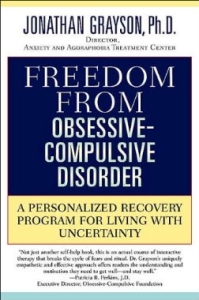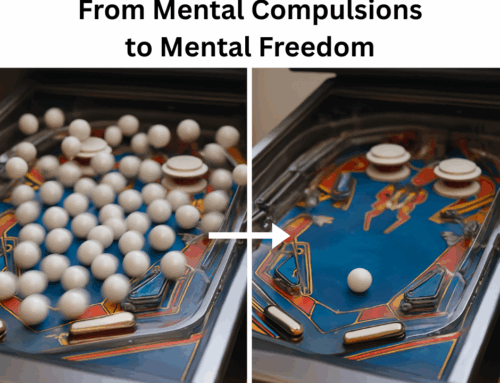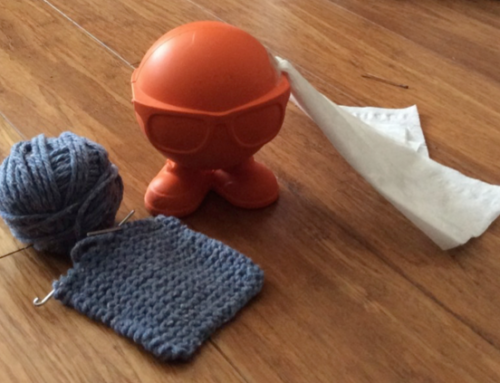One of the things I love most about Freedom from Obsessive-Compulsive Disorder by Jonathan Grayson, PhD is Dr. Grayson’s focus on intolerance of uncertainty as the root of OCD. The first time I heard of “intolerance of uncertainty,” a light bulb went off. “Dr. Grayson is right!” I thought. “My OCD wants 100%, undeniable, absolute certainty about everything. And it makes me do rituals to try to get it, but it never can, because certainty is impossible. The only thing that’s certain is my OCD is afraid of uncertainty!”
Adding uncertainty to exposures
Once I learned this concept, I started incorporating uncertainty into all my exposure and response prevention exercises. For example, for one of my contamination exposures I changed what I was saying to myself during the exposure from “I’m probably going to get some dread disease and die because I just ate off the floor,” to the more uncertainty-friendly, “I may get some dread disease and die because I just ate off the floor. But I may not. It’s impossible to know.” For me, adding the concept of uncertainty into my exposures seemed to make them work better, because they went right to the heart of what I was afraid of: the uncertainty about whether I might or might not get the dread disease, not the disease itself.
Control is an illusion
OCD makes lots of false promises and one of those is that you can control everything in life through your rituals. That you can keep your family safe. That you can prevent disasters. That you can be perfect or feel “just right.” But that control is an illusion. Only by letting go of that control can we truly be free.
Using uncertainty in my exposures helped me let go of the illusion of control. I built my tolerance for uncertainty by embracing it at every opportunity. For instance, here is one script I would say after my OCD told me that I had probably hurt someone’s feelings: “I may or may not have hurt that person’s feelings. I will never know. In fact, even if I ask the person if I did, she may lie to me to spare my feelings. So there is no way to know if I did. I may or may not, but I’m willing to risk that uncertainty to get over this awful OCD.”
Experiencing freedom
What’s funny about exposure scripts containing uncertainty is that for me they provoke both anxiety and a feeling of freedom. Anxiety that I really don’t have control, that I really won’t ever know. And freedom that I don’t have to try to control this aspect of life. That I can let go. And that if I can let go of this, maybe I can let go of control in other areas of life, so that I can experience what freedom is actually like.
So Freedom from Obsessive-Compulsive Disorder is aptly named, and I highly recommend it to anyone suffering from OCD.
Postscript
Jon and I have become friends since I wrote this post a few years ago. He also wrote a blog post about my 2014 IOCDF Conference blog post (if that’s not too confusing….), and we’ve presented together numerous times since at national conferences. A full list of those presentations and links to pages containing handouts can be found on the About Shala page under Speaking Engagements.
Learn more about taming OCD
To learn more about how Dr. Grayson taught me that the goal of ERP is to live in a world of uncertainty and be happy anyway, see Chapter 13 in Is Fred in the Refrigerator? Taming OCD and Reclaiming My Life. Click here to purchase a copy.
Sign up for my Shoulders Back! newsletter to receive OCD-taming tips & resources, including notifications of new blog posts, delivered every month to your inbox.
My blogs are not a replacement for therapy, and I encourage all readers who have obsessive compulsive disorder to find a competent ERP therapist. See the IOCDF treatment provider database for a provider near you. And never give up hope, because you can tame OCD and reclaim your life!








Any tip on script writing for real event ocd? When you actually did something and/or something awful actually did happen?
Thanks.
Yes, please see my blog on using “may or may not” statements at https://www.shalanicely.com/aha-moments/recovery-from-ocd/interrupt-the-cycle-of-mental-rituals-in-ocd-with-may-or-may-not/. With real event OCD, the OCD is typically worried about some uncertainty surrounding the real event, and we focus any ERP script on the uncertainties. It’s also really important to remember that OCD is not about the content of the worries, it’s about uncertainty, and so you can do scripts with any type of OCD. I hope that helps!